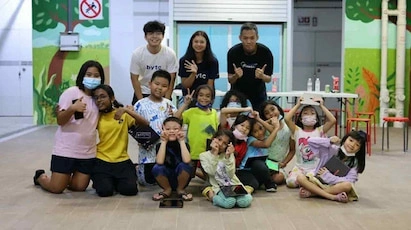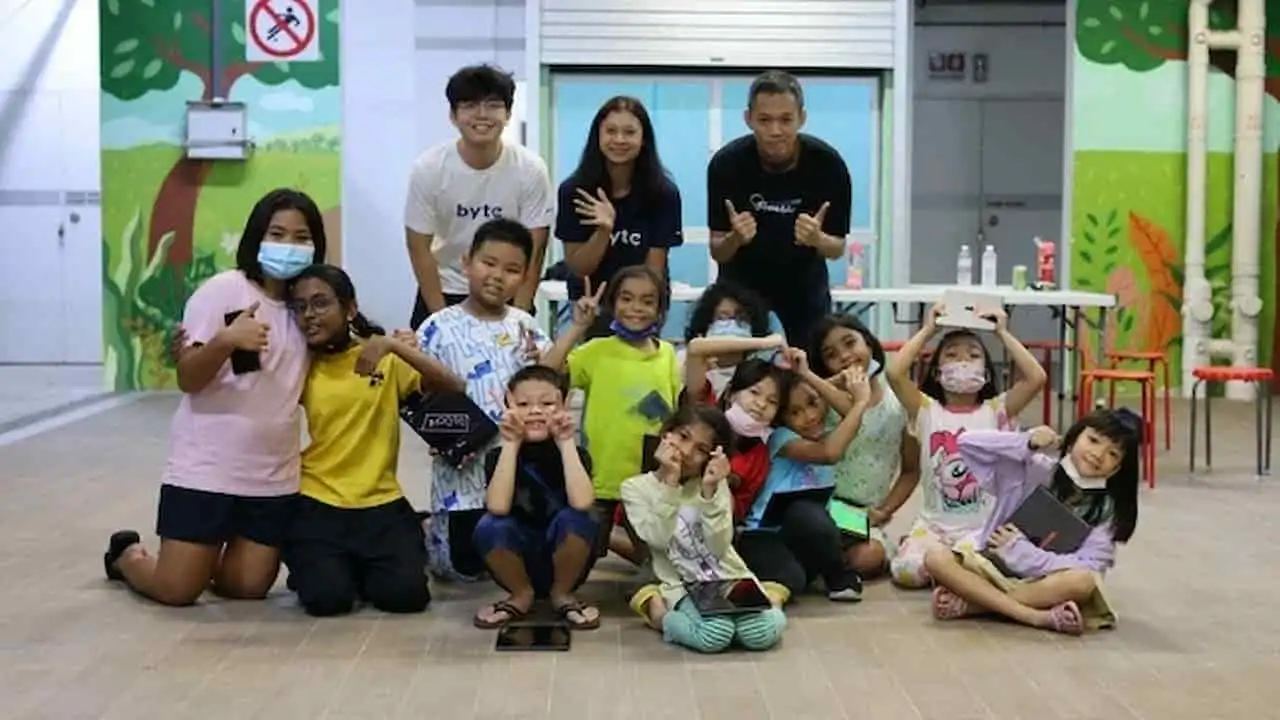Children today are born into a world where technology is deeply integrated into the fabric of daily life. Recognising that children from disadvantaged families may miss out on opportunities to acquire such skills, BYTE (Bringing You Technology Empowerment) started a community ground-up and non-profit initiative to empower lives through science, technology, and design.
Named the Void-Deck Technology Labs (VDTL), BYTE successfully applied for the Digital for Life Fund (DfL) set up by Infocomm Media Development Authority (IMDA) to sustain this ground-up project that would help children build the confidence and interest to enhance their digital literacy and skills.
Bringing science and technology to the doorstep
BYTE was founded in 2020 by a group of professionals from the technology industry who wanted to use their workplace skills to support underserved communities.
“We had a front-row seat to see how rapidly technology was being incorporated into the way we live and work and recognised this as a key skill set for the future,” explains Maria Wilson, one of the three BYTE founders.
To give disadvantaged primary school children easy access to these skills, the VDTL brings technology enrichment classes to the void decks of their HDB flats, so they will not need to struggle with transport and travel arrangements.
Lessons revolve around two main cores of science and technology. The former covers topics to do with animals, the environment and climate, while the latter delves into building chatbots, games and websites.
In the process, children also learn about technology like Augmented Reality (AR) and Artificial Intelligence (AI). They are taught to use tools like block-programming system, Scratch, Padlet, Google Docs and other free online resources. Through this, the children pick up relevant skills and knowledge for their future.
“My favourite module is ‘Planet and Us” because I learned a lot of interesting facts about the earth and how we impact the environment around us,” 11-year-old Trisha d/o Kadeveeran shares. She adds that since joining the VDTL in 2021, she has become better at using online resources for her schoolwork.
Relationships at the heart of VDTL's success
What stands out the most for VTDL from other skills development programmes is its ability to develop confidence and an interest in learning. The curriculum has undergone multiple adjustments after receiving feedback, and the programme is now designed to build lasting relationships between the volunteers and children.
Maria shares that the founders’ volunteering experience with disadvantaged youths taught them that ad-hoc sessions made it hard to build rapport, especially with those from disadvantaged homes. Instead, they found what worked was to have longer, structured weekly or bi-weekly programmes.
In recognition of this, the VDTL spans 48 weeks to give volunteers sufficient time to develop a relationship with the children. There is also a high volunteer-to-beneficiary ratio to ensure that each child gets the attention they need. In some cases, this includes offering one-to-one support.
Maria notes that the benefits of having fixed volunteer-child pairs go two ways: The child is more comfortable expressing himself/herself with a familiar adult, and the volunteer is also clear about what methods work best with the child. As they build rapport and trust, children also gradually become more confident about themselves.
Results thus far are encouraging; children who were initially extremely closed off are now comfortable speaking up and sharing with the class.
Mohamed Elfie Bin Elias, aged 10, has improved his public speaking skills tremendously since joining in 2021. “I’ve learnt to present my work better and I am now not afraid to speak up in front of the class,” he exclaims.
Developing a culture of inclusivity
Maria reiterates that in her experience, developing confidence is the biggest gap for children from disadvantaged homes to cross.
“As such, we want the VDTL to be a place where they are respected, taught that they are important, and understand that their learning is important.”
To facilitate this, the VDTL is run in a modular fashion. There are six modules, with each module comprising eight weekly or bi-weekly sessions. Each session is standalone, and there are no prerequisites for attending. This ensures the programme will not exclude children who cannot commit to all sessions.
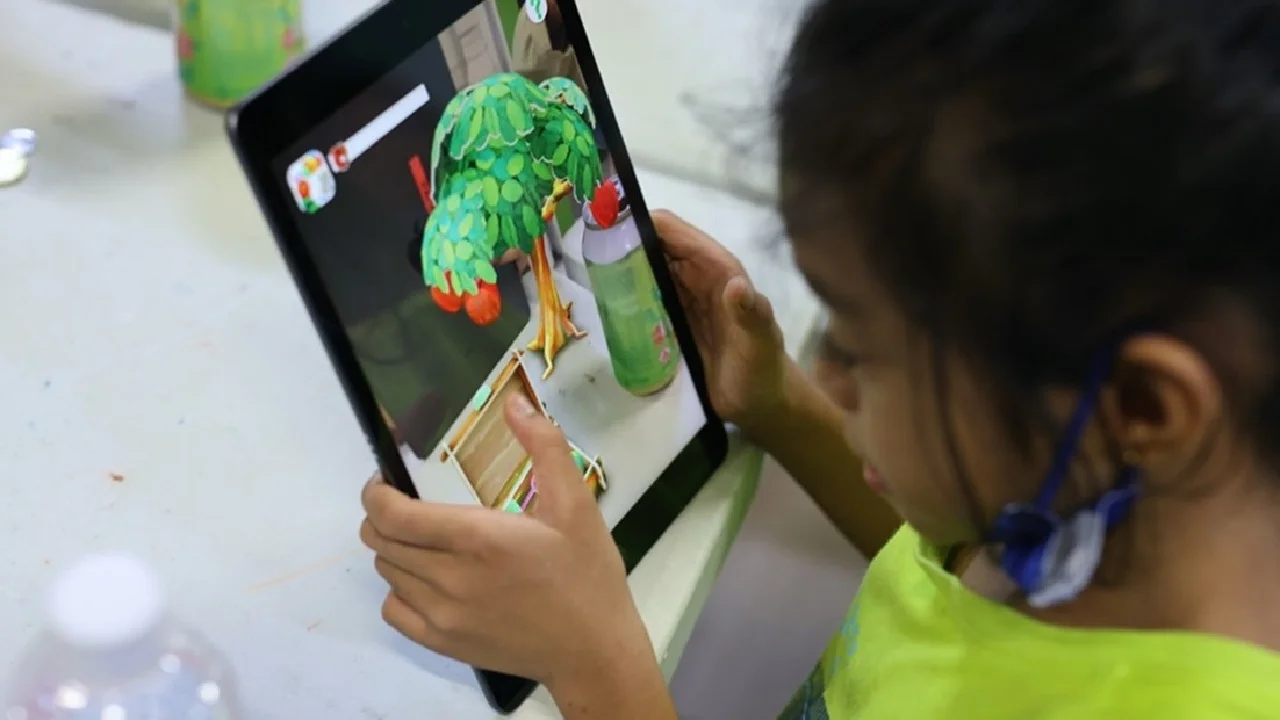
By using a tablet to learn about the animal kingdom, this VDTL participant gains both knowledge about the world, and about technology
Activities are tailored to different learning abilities. Children are encouraged to take autonomy over their learning and explore areas within each topic that interest them most.
Maria believes this autonomy is particularly important because the children may not be attending school regularly and, as a result, struggle academically.
“The last thing we want is for them to come to the VDTL and feel like they can’t keep up and don’t have the confidence to engage in learning,” she states.
Building a solid volunteer pool
BYTE’s culture of support extends beyond beneficiaries to its volunteers as well.
“A lot of the kids really look up to the volunteers and value the bond they have,” Maria says, adding that this makes it important for BYTE to find volunteers who have both the heart for the children and the ability to commit each week.
To help develop long-term relationships, BYTE runs briefing sessions where volunteers share their experiences to give new volunteer recruits an understanding of what the work will be like and if they are suitable.
There are also regular debriefing sessions for volunteers to discuss their challenges so the team can brainstorm for solutions and provide support. In addition, BYTE works with volunteers to help them develop skills or kickstart initiatives they are interested in.
“Volunteers at BYTE are more engaged in discussions and involved in the process of evolving the content through regular feedback sessions and debriefings. It helps make the volunteering process more insightful and valuable,” Maria adds on.
This approach has made BYTE stand out from other organisations.
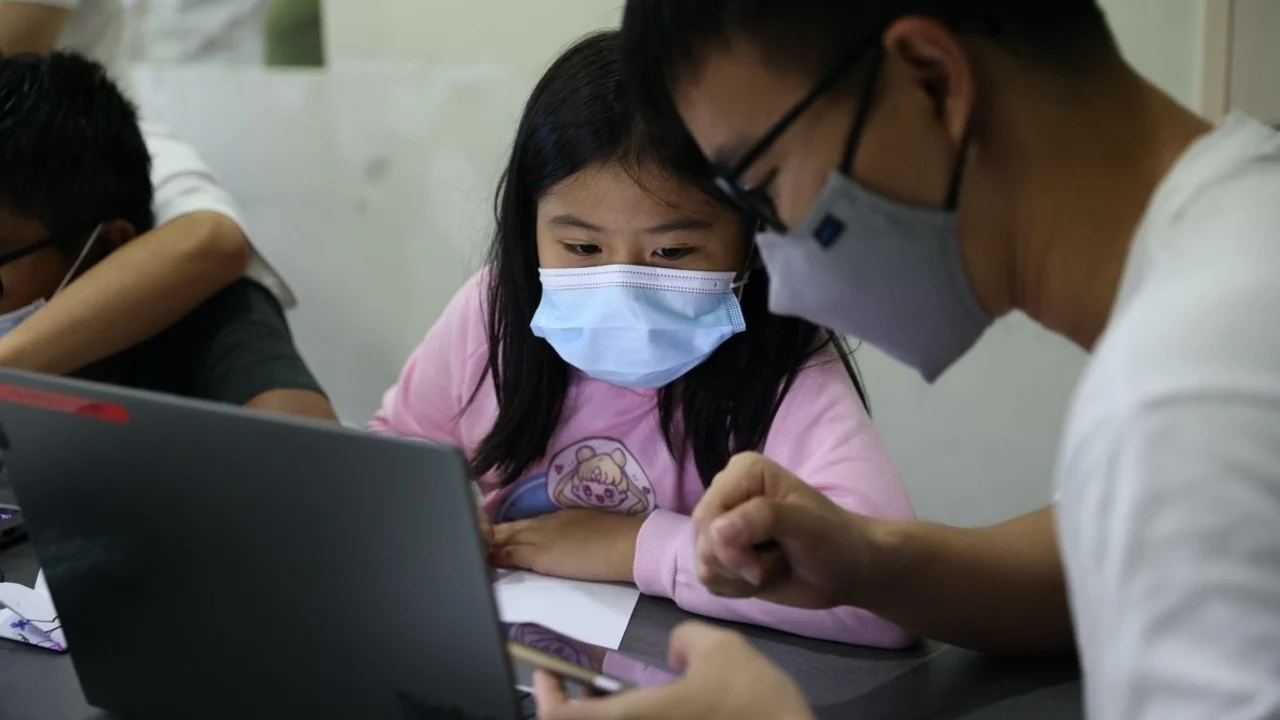
A participant learning to build a chatbot using a block-based programming language, Scratch with a VDTL volunteer.
It takes a village to sustain ground-up initiatives
Since its pilot programme that first ran in Yishun in 2021, BYTE has expanded the VDTL to Jurong West and Chai Chee. It even has plans to enter Tanjong Pagar and Tampines in the near future. Reflecting on the VDTL’s growth, Maria declares, “It takes a whole village to run these programmes for our beneficiaries each week successfully.”
She shares that the team is particularly grateful for location partners like Red Cross Singapore, Nanyang Students Assistance Scheme (SAS), KidzCare Programme @ Bedok and Bukit Batok East CC, which connect them with the disadvantaged families in each neighbourhood.
“Our programme partners help us identify the right beneficiaries and supplement our volunteer base with their own volunteers. They also help strengthen the partnership we have with beneficiaries by providing us with additional information, and encouraging beneficiaries to continue with the programme,” BYTE, co-founder, Shaikh Ismail explains.
The benefits go two ways. For example, BYTE contributes to the Singapore Red Cross’ Young Hearts programme, which aims to give young children from lower income families a safe space for learning and access to volunteer tutors who help them overcome academic gaps.
“BYTE’s enrichment programmes such as the Young Scientist workshop propels our outreach and deepens engagement to the next level,” Selene Ong, Head, Community Resilience Department, Singapore Red Cross shares.
Shaikh adds that credit is also due to IMDA’s DfL movement for connecting BYTE to a larger ecosystem of partners. Organisations like Oracle and Standard Chartered Singapore provided volunteers while Micron sponsored 320 ART kits for the VTDL to continue during the pandemic.
Joining the village to make a difference is also ESR, a local real estate management company. ESR provided BYTE with a timely donation of 40 pre-loved corporate laptops, which were crucial for BYTE’s expansion to new locations this year.
“At ESR, we are committed to sustainable development and support meaningful causes to drive positive community change and provide equal opportunities to benefit communities where our businesses operate in. From supporting disaster response, to education and social endeavours, we hope our contributions will help to improve lives wherever we operate in the world,” Lilian Lee, Group Chief Corporate Officer, ESR Group Limited, explains.
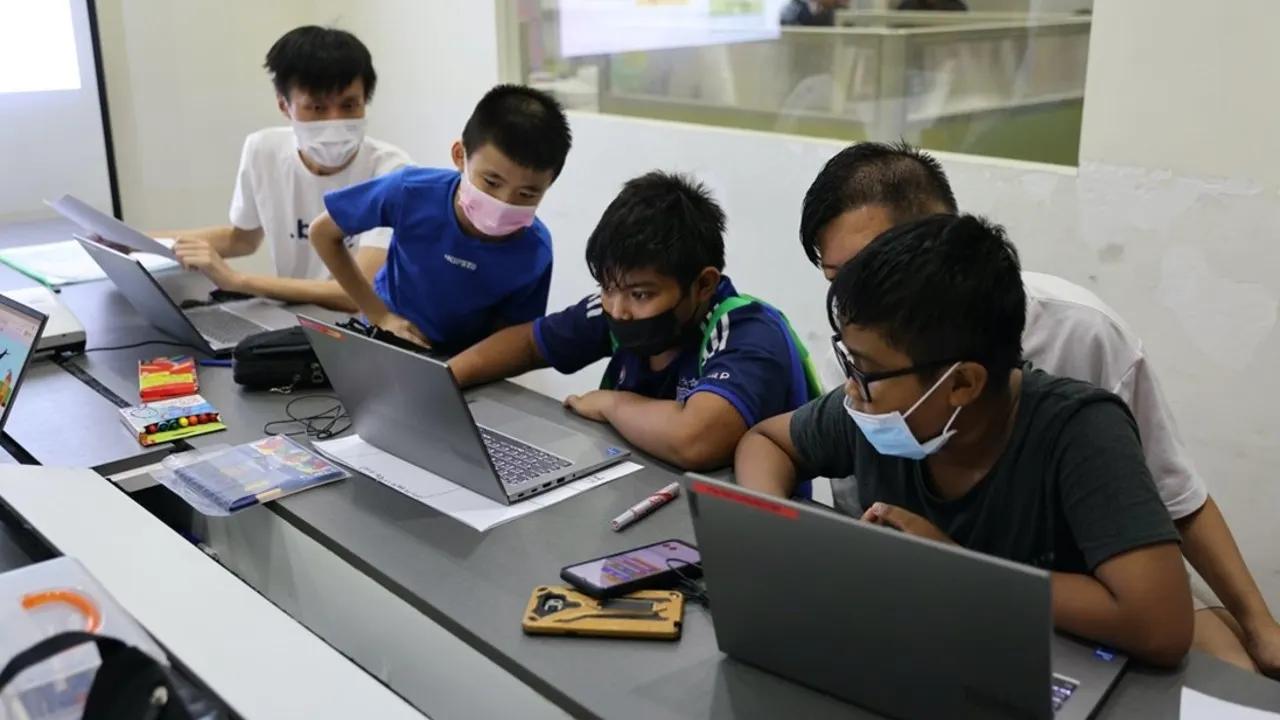
BYTE works closely with partners in different neighbourhoods to reach participants. Here, the VDTL session is being held at Red Cross Singapore’s premises in Yishun.
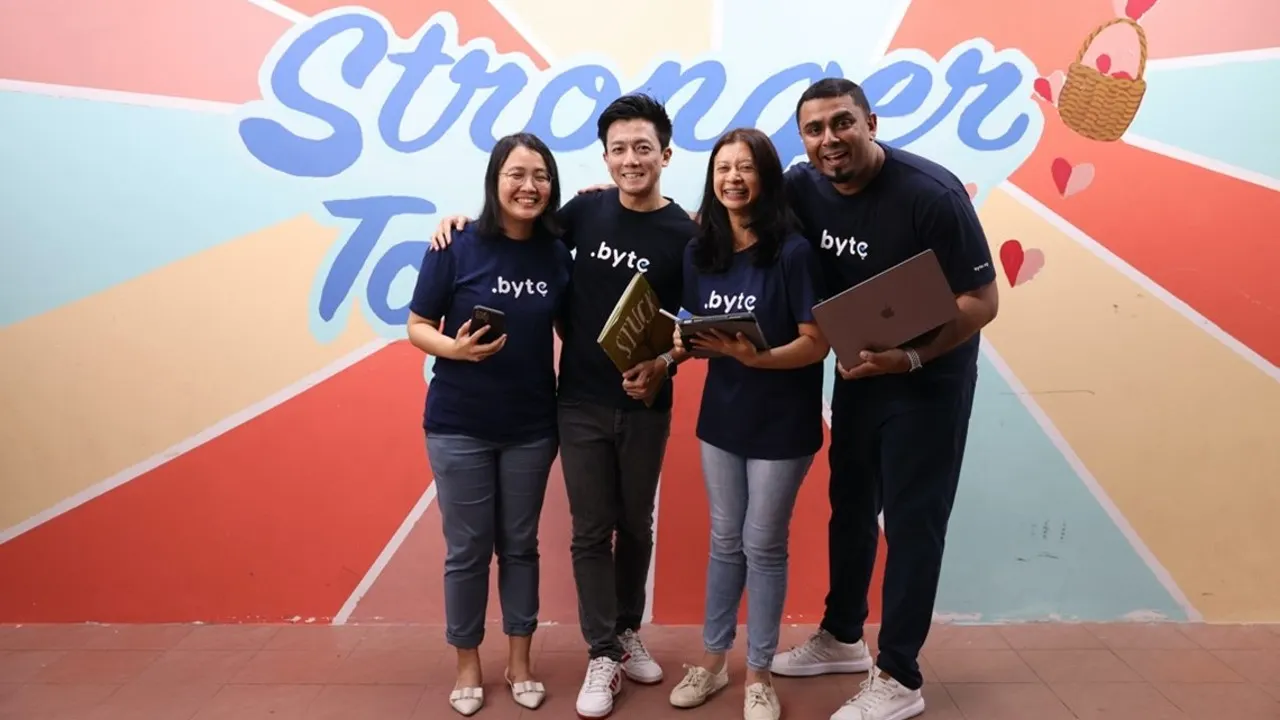
[From left to right] Jin Wang, Co-founder, BYTE, Wilson Chua, Head of Volunteer Management, BYTE, Maria Wilson, Co-founder, BYTE, Shaikh Ismail, Co-founder, BYTE
Join us to sow the seeds of change within the community!
More can be done. As a ground-up initiative, BYTE’s operational needs, such as devices and connectivity, continue to grow. These have been especially important for the organisation to meet its long-term aspirations of setting up permanent VDTL at void decks, expanding its offerings to beneficiaries like single parents and return-to-work mothers, as well as enhancing its curriculum to keep up with new technological changes.
You, too, can help children develop their confidence and potential.
- Join as a volunteer. BYTE currently runs classes at 6 locations, Yishun, Nanyang (Jurong West), Bukit Batok, Bedok, Leng Kee (Redhill) and Whampoa, on either weekday evenings or Saturday mornings. BYTE also welcomes individuals who wish to take up leadership in ground-up initiatives.
- Volunteer with your school or organisation. BYTE works with schools and organisations to design appropriate volunteering opportunities.
- Donate devices. BYTE’s classes require one laptop or tablet per child to ensure that each learner’s ability can be appropriately accommodated. Donations of multiple pre-loved devices from organisations are highly impactful to enabling BYTE to meet their device requirements.
Reach out to BYTE at www.byte.sg. You can also check out the other IMDA DfL projects to see how you can do your part to create a digitally inclusive future for Singapore!












